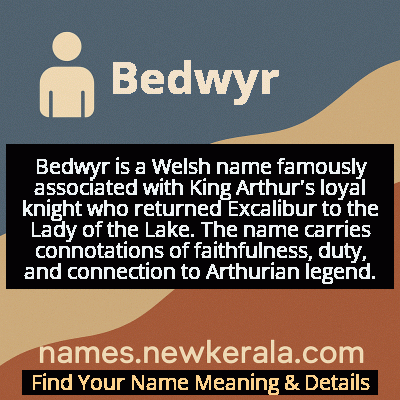Bedwyr Name Meaning & Details
Origin, Popularity, Numerology Analysis & Name Meaning of Bedwyr
Discover the origin, meaning, and cultural significance of the name BEDWYR. Delve into its historical roots and explore the lasting impact it has had on communities and traditions.
Name
Bedwyr
Gender
Male
Origin
Arthurian
Lucky Number
5
Meaning of the Name - Bedwyr
Bedwyr is a Welsh name famously associated with King Arthur's loyal knight who returned Excalibur to the Lady of the Lake. The name carries connotations of faithfulness, duty, and connection to Arthurian legend.
Bedwyr - Complete Numerology Analysis
Your Numerology Number
Based on Pythagorean Numerology System
Ruling Planet
Mercury
Positive Nature
Adventurous, dynamic, curious, and social.
Negative Traits
Restless, impatient, inconsistent, prone to indulgence.
Lucky Colours
Green, white.
Lucky Days
Wednesday.
Lucky Stones
Emerald.
Harmony Numbers
1, 3, 9.
Best Suited Professions
Sales, marketing, travel, entertainment.
What People Like About You
Versatility, charisma, adventurous spirit.
Famous People Named Bedwyr
Bedwyr
Arthurian Knight
One of King Arthur's most trusted knights who returned Excalibur to the Lady of the Lake after Arthur's final battle
Bedwyr of Cornwall
Legendary Warrior
Known as Bedwyr Bedrydant in Welsh tradition, noted for his exceptional spear-fighting skills and loyalty to Arthur
Saint Bedwyr
Early Christian Saint
Welsh saint associated with early Celtic Christianity in Wales, though historical details are scarce
Name Variations & International Equivalents
Click on blue names to explore their detailed meanings. Gray names with will be available soon.
Cultural & Historical Significance
Extended Personality Analysis
Bedwyr's character is defined by profound loyalty and practical wisdom. Throughout Arthurian literature, he consistently appears as Arthur's most dependable companion, present from the earliest adventures through the final tragedy at Camlann. His personality combines martial competence with emotional intelligence—he is both a skilled fighter and a trusted confidant. The famous scene where he reluctantly returns Excalibur demonstrates his internal conflict between personal attachment and duty, ultimately choosing to honor his king's command despite his grief. This reveals a character of deep integrity who understands that some responsibilities transcend personal desire. Bedwyr represents the ideal of service without ambition, content to support rather than lead, yet possessing the strength to carry out the most difficult tasks when required. His steadfast nature provides a counterbalance to the more volatile personalities in Arthur's court, making him the bedrock upon which Camelot's stability depends.
Modern Usage & Popularity
In contemporary naming practices, Bedwyr remains predominantly within Welsh-speaking communities and Arthurian enthusiasts, though it has seen occasional revival as part of the broader Celtic naming trend. The name has never achieved widespread popularity outside Wales, maintaining its status as a distinctive choice that signals cultural heritage or literary appreciation. In recent decades, there has been modest interest in the name among parents seeking unique historical names with strong mythological connections. It occasionally appears in fantasy literature and role-playing games, helping to maintain its presence in popular culture. The name's rarity makes it an appealing choice for those wanting a distinctive yet historically grounded name, though its unusual spelling and pronunciation outside Wales often lead to the more familiar 'Bedivere' variant being used in English-speaking contexts.
Symbolic & Spiritual Meanings
Bedwyr symbolizes the archetype of the faithful executor—the person who carries out necessary endings and ensures proper transitions. His most significant symbolic role comes from returning Excalibur to the lake, representing the acceptance of mortality, the closing of great cycles, and the respectful return of power to its source. This act makes him a symbol of closure and faithful service beyond the grave. The name also represents cultural continuity, bridging ancient Welsh warrior traditions with medieval chivalric ideals. Bedwyr embodies the virtue of loyalty that persists even when kingdoms fall and legends end. He symbolizes the quiet strength that supports great leaders and the wisdom to understand that some endings are necessary for new beginnings to emerge. His character teaches that true heroism often lies in carrying out difficult final duties rather than seeking glory.

